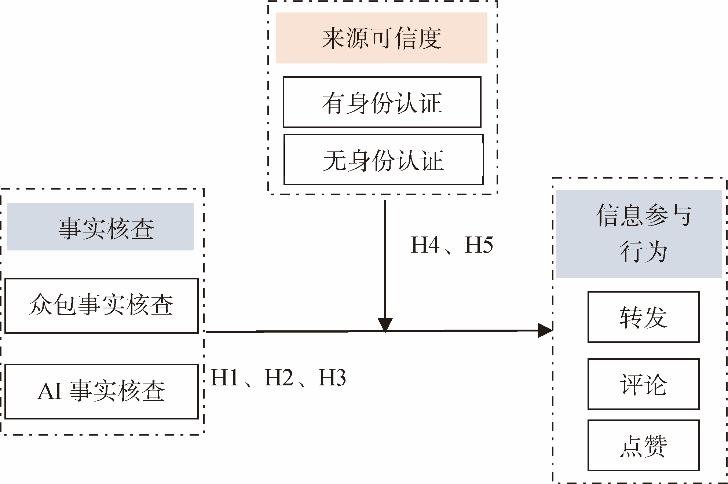 PDF(1723 KB)
PDF(1723 KB)


信任群体智慧还是AI智能?人智融合事实核查对用户信息参与行为的影响研究
吴联仁, 胡亚男, 李瑾颉, 齐佳音
知识管理论坛 ›› 2025, Vol. 10 ›› Issue (4) : 309-320.
 PDF(1723 KB)
PDF(1723 KB)
 PDF(1723 KB)
PDF(1723 KB)
信任群体智慧还是AI智能?人智融合事实核查对用户信息参与行为的影响研究
Trust the Crowd-wisdom or AI? Research on the Impact of Human-AI Integration Fact Checking on User Information Engagement Behavior
【目的/意义】 事实核查是一种应对虚假信息传播的有效策略,探究事实核查类型中众包事实核查和AI事实核查及其融合对用户信息参与行为的影响,有利于社交媒体平台改进和优化虚假信息治理措施。 【方法/过程】 基于社交媒体平台真实数据,采用方差分析探究众包事实核查和AI事实核查对用户信息参与行为的影响,同时考虑来源可信度的调节作用。 【结果/结论】 实证结果表明,众包事实核查显著影响用户的信息参与行为,正向核查促进用户信息参与行为,负向核查遏制信息参与行为;AI事实核查正向影响用户的信息参与行为,且AI事实核查和众包事实核查融合正向影响用户的信息参与行为;来源可信度正向调节众包事实核查和信息参与行为的关系,也正向调节AI事实核查和信息参与行为的关系。研究结果揭示不同类型事实核查及其融合对用户信息参与行为的影响,为社交媒体平台充分利用群体智慧和AI智能进行虚假信息的事实核查和治理提供理论支持。
[Purpose/Significance] Fact-checking is an effective strategy to combat the dissemination of misinformation. Exploring the mechanism of how fact-checking types (crowdsourced and AI fact-checking) influence users' information participation behavior can help social platforms improve and optimize their measures for misinformation governance. [Method/Process] Based on real data from social media platforms, this study used analysis of variance to investigate the impact of fact-checking on users' information participation behavior, while considering the moderating effect of source credibility. [Result/Conclusion] The empirical results show that crowdsourced fact-checking significantly affects users' information engagement behavior, with positive fact-checking promoting information participation behavior and negative fact-checking inhibiting it. AI fact-checking positively influences users' information engagement behavior, and the combination of AI and crowdsourced fact-checking also positively affects users' information engagement behavior. Source credibility positively moderates the relationship between crowdsourced fact-checking and information engagement behavior, as well as the relationship between AI fact-checking and information engagement behavior. This study reveals the impact of different types of fact-checking and their integration on information engagement behavior, providing theoretical support for social media platforms to fully utilize collective intelligence and AI for fact-checking and misinformation governance.

人智融合 / 众包事实核查 / AI事实核查 / 信息参与行为 / 来源可信度
human-AI integration / crowdsourced fact-checking / AI fact-checking / information engagement behavior / source credibility
| [1] |
张新生, 王润周, 马玉龙. AIGC背景下虚假信息治理挑战、机会与策略研究 [J/OL]. 情报科学, 1-23[2025-06-22]. http://kns.cnki.net/kcms/detail/22.1264.G2.20241111.1002.024.html.
|
| [2] |
|
| [3] |
|
| [4] |
|
| [5] |
|
| [6] |
王喆诚, 于瑞峰. 社会存在、警惕性及信息卷入度对个体事实核查的影响[J]. 心理技术与应用, 2023, 11(1): 42-49.
|
| [7] |
|
| [8] |
|
| [9] |
|
| [10] |
|
| [11] |
|
| [12] |
|
| [13] |
管佖路, 顾理平. 价值冲突与治理出路:虚假信息治理中的人工智能技术研究[J]. 新闻大学, 2022(3): 61-75, 119.
|
| [14] |
|
| [15] |
|
| [16] |
|
| [17] |
|
| [18] |
|
| [19] |
|
| [20] |
|
| [21] |
|
| [22] |
|
| [23] |
|
| [24] |
|
| [25] |
|
| [26] |
|
| [27] |
王钰昱, 夏志杰. 基于事实核查标签的众包方法应对虚假信息的效果差异及认知机制研究[J]. 知识管理论坛, 2024, 9(3): 330-340.
|
| [28] |
李瑾颉, 聂凯伦, 吴联仁, 等. 众包事实核查对信息参与行为的影响:基于来源可信度的调节 [J]. 知识管理论坛, 2024, 9(4): 367-379.
|
| [29] |
|
| [30] |
|
| [31] |
|
| [32] |
|
| [33] |
|
| [34] |
|
| [35] |
|
| [36] |
|
| [37] |
|
| [38] |
|
| [39] |
|
| [40] |
|
| [41] |
叶凤云, 常琳, 秦琴, 等. 基于虚假信息特征的社交媒体大学生用户感知信任研究 [J]. 情报理论与实践, 2024, 47(10): 118-127.
|
| [42] |
|
| [43] |
|
| [44] |
|
| [45] |
|
| [46] |
|
| [47] |
|
| [48] |
|
吴联仁:研究选题与框架拟定,论文理论部分撰写与修改;
胡亚男:数据收集与分析;
李瑾颉:论文实证部分撰写与修改;
齐佳音:论文修改与指导。
/
| 〈 |
|
〉 |